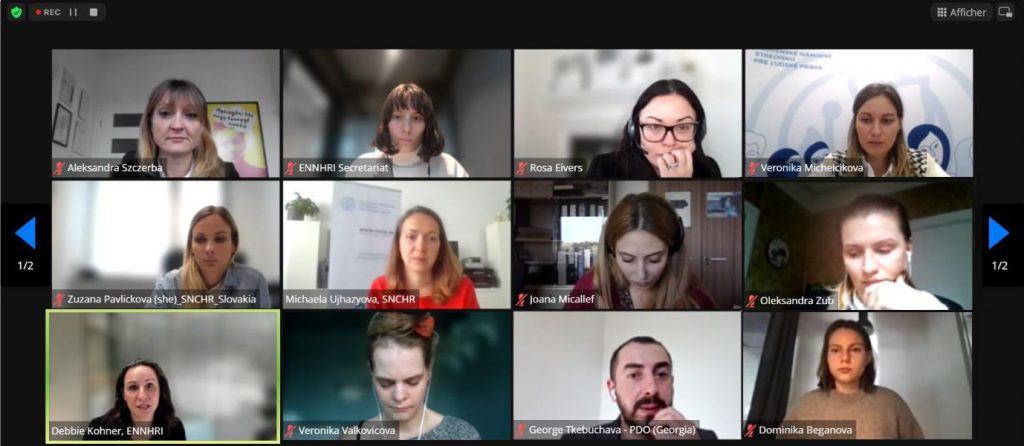Online seminar, 13 November 2023

Sexual harassment (SH), recognized as a form of discrimination and gender-based violence, is illegal under EU Directives and protected against by various human rights documents at both European and global levels. Despite these protections, SH continues to be a problem in workplaces. National Human Rights Institutions (NHRIs) and Equality Bodies (EBs) are key players in fighting SH in Europe. Their role involves conducting research, advocacy, reporting, and promoting a zero-tolerance policy towards sexist behavior. To effectively combat SH, NHRIs and EBs need to monitor SH cases, identify reporting barriers, clarify workplace protection measures, and advocate for stronger national policies.
The Slovak National Center for Human Rights (SNCHR), supported by the European Network of National Human Rights Institutions (ENNHRI) Small Grants Programme, conducted research on SH in the healthcare sector in Slovakia from May to October 2023. This research involved a representative sample of respondents and led to expert recommendations, fieldwork experience, and practical knowledge. The collected data will be utilized for reporting, advocacy, legal analysis, and counseling.
As a follow-up of completing the research, the SNCHR, in partnership with the ENNHRI decided to organize a peer-learning online seminar. The objective of this seminar was to provide a platform for connecting individuals from National Human Rights Institutions (NHRIs) and Equality Bodies, creating an opportunity for these professionals to share their valuable experiences and learn from one another. The seminar’s primary focus was on the methodologies of conducting quantitative research on sexual harassment, the acquisition of reliable data, sharing good practices and the application of this data in various critical areas.
We were delighted that Ms. Debbie Kohner, the Secretary-General of ENNHRI, welcomed us and opened the seminar, setting the stage for a productive and insightful event. The seminar was split into two parts during which multiple speakers shared their knowledge while maintaining space for Q&A and discussion.
PART 1: How to collect reliable data on sexual harassment – from preparations to data collection.
Research on sexual harassment at the workplace in the health sector was presented, focusing on preliminary results and lessons learned. As part of the National Action Plan for equality of women and men in the Slovak Republic (2022 – 2027), the SNCHR committed to regularly monitoring sexual harassment at workplaces. In the session, the SNCHR introduced the research design, shared preliminary results, and discussed various “backstage” dilemmas and lessons learned, such as cooperation with public authorities, fieldwork preparation and training, and the gap between expectations and reality in workplaces.
The session featured speakers Ms. Michaela Ujházyová, head of research at SNCHR, along with Ms. Dominika Begáňová and Ms. Alexandra Dekanová, junior researchers and data collectors for the SNCHR research.
Three examples of sexual harassment research conducted in Poland were discussed, covering uniformed services, professional sports, and academia. The Commission for Human Rights of the Republic of Poland had carried out several research studies on sexual harassment in recent years. Each study focused on a specific sector, highlighting the variations in sexual harassment across different workplaces, services, and other life areas. This session offered the webinar participants a unique opportunity to compare and contrast available data and strategies among NHRIs, fostering a collaborative environment where shared expertise could be effectively employed in their respective fields.
The session was led by Ms. Aleksandra Szczerba, an anti-discrimination lawyer with the Commission for Human Rights of the Republic of Poland (CHRP).
PART 2: How to use research data in our mandates – reporting, legal protection, education.
In this session, Ms. Veronika Michelčíková, a lawyer at SNCHR, focused on the legal framework and explained the legal aspects of the research field and how the collected data could be utilized for legal purposes. Participants engaged in group work and discussions, sharing their experiences in using research data for legal solutions. This included strategic litigation, out-of-court settlements, and discussions with relevant partners. The session provided a platform for exchanging insights and practical approaches to applying research findings in legal contexts.
In the next session, Ms. Zuzana Pavlíčková, head of policy and international relations at SNCHR focused on reporting data on sexual harassment and participants explored how to use data collected by NHRIs and/or Equality Bodies. They focused on incorporating this data into reports on the implementation of human rights obligations to UN Treaty Bodies, other UN mechanisms, the European Committee of Social Rights, the European Commission, and various regional and international monitoring mechanisms. This session offered insights into effectively utilizing sexual harassment data in broader human rights reporting contexts.
In the final session, The Slovak Institute for Family and Labor Research’s team, working on the National Project on Prevention and Elimination of Gender Discrimination since 2018, presented their findings on responding to sexual harassment in organizations with a data-driven approach. Focusing on sexual harassment as a form of discrimination, the team conducted qualitative research in 2020, centering on personal experiences with sexual harassment over the past five years. This seminar contribution aimed to merge the research results with the team’s extensive experience in organizing prevention trainings and seminars. Utilizing the data, they highlighted key areas in organizational policies that require attention for a diligent and trauma-informed response to sexual harassment. The session was led by Ms. Veronika Valkovičová, a researcher and university lecturer at the Institute for Family and Labor Research, Slovak Academy of Sciences.
In conclusion, the seminar provided a diverse array of insights, research findings, and collaborative discussions, marking a step forward in addressing and combating sexual harassment across various sectors. The Slovak National Center for Human Rights is pleased to have hosted this seminar, establishing a platform for learning, inspiration, and support among professionals in the field of human rights.







